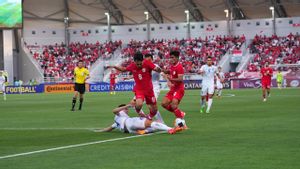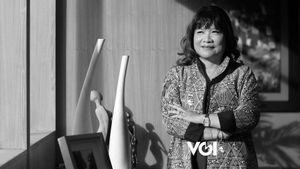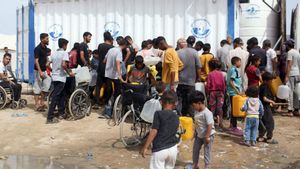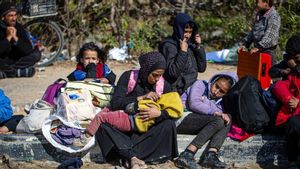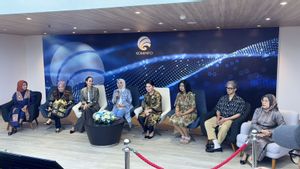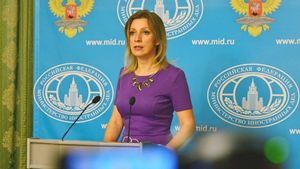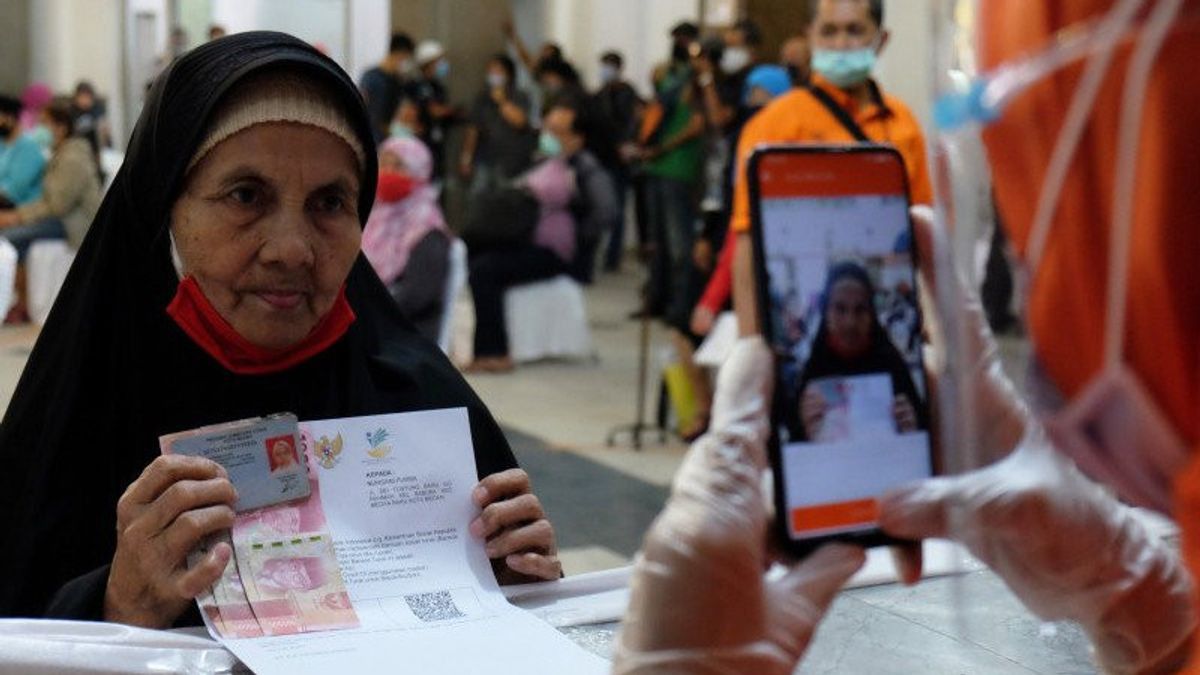
JAKARTA - The increasing number of COVID-19 sufferers has forced the Indonesian government to make policies by limiting community activities. Various terms are used to force Indonesians to limit their activities outside the home. For July 2021, the restriction is called the Enforcement of Emergency Community Activity Restrictions (PPKM).
It seemed to have subsided, but the number of positive COVID-19 actually skyrocketed. Emergency PPKM has been implemented in Java and Bali since July 3 and will be in effect until July 20. The question is, what will happen to the people who cannot make a living due to these restrictions? The Indonesian government provides social assistance (bansos) for the community, especially the poor.

Various social assistance programs were launched by the government. First, the Family Hope Program (PKH). This program is targeted to reach 10 million Beneficiary Families (KPM). In 2021, the allocation for PKH is IDR 28.31 trillion. There are three groups of criteria for receiving PKH social assistance. First, the criteria for health components are pregnant women, a maximum of two pregnancies and children aged 0 to 6 years, a maximum of two children.
Second, the criteria for the education component are Elementary School (SD), Madrasah Ibtidaiyah (MI) or equivalent, Junior High School (SMP) children, Madrasah Tsanawiyah (MTs) or equivalent, High School (SMA) children, Madrasah Aliyah (MA) or equivalent, and children aged 6 to 21 years who have not completed 12 years of compulsory education.
Then the third group, namely the criteria for social welfare components, namely the elderly from 60 years and over, a maximum of 1 person and being in the family; and persons with disabilities are prioritized for persons with severe disabilities, a maximum of 1 person and are in the family. Thus, families whose members belong to these groups are entitled to PKH social assistance. PKH itself is distributed every 3 months in 4 stages, namely in January, April, July, and October 2021. The funds can be withdrawn through HIMBARA member banks (BNI, BRI, Bank Mandiri, and BTN).
The amount received for each category is also different, namely pregnant women get Rp. 3 million or Rp. 750 thousand per three months, people with disabilities and the elderly get Rp. 2.4 million or Rp. 600 thousand per three months, Elementary students get Rp. 900 thousand or Rp. 225 thousand per three months, For junior high school students Rp. 1.5 million or Rp. 375 thousand per three months, high school students Rp. 2 million or Rp. 500 thousand per three months, and early childhood children of Rp. 3 million or Rp. 750 thousand per three months.
It is hoped that the funds received by families receiving PKH assistance can be used for various needs such as improving family health, children's education, meeting the basic needs of business capital, saving, and reducing family burdens.

In addition to PKH, the government also provides social assistance through the Sembako Card program. The Basic Food Card is available for 18.8 million KPM with a value of Rp. 200 thousand per month. The government allocated Rp42.37 trillion for this program. However, until June 2021, what has been realized is Rp. 17.75 trillion for 15.9 million KPM. Thus, in July there is still room for 3 million KPM to receive basic food cards with a value of Rp. 200 thousand per month.
To get basic food cards in July 2021, people need to have a Prosperous Family Card (KKS). To get the KKS, the community must be registered as a KPM for the social assistance card, the BPNT Basic Food Card, which is recorded in the Social Welfare Integrated Data (DTKS) of the Ministry of Social Affairs. For July 2021, recipients will receive a basic food card worth Rp. 600 thousand for January, April, and July.
Because this Basic Food Card is a non-cash aid, therefore it can only be spent at e-warong. KPMs who have KKS can shop for food items such as rice, oil, and eggs at the e-warong provided by the Ministry of Social Affairs. The transaction is carried out non-cash because it depends on the amount of balance stored on the KKS chip.
Cash Assistance (BST)Then there is the Cash Social Assistance (BST). BST was extended until August 2021 with a target of 10 million KPM. The value given is IDR 300 thousand per KPM per month. The recipient immediately gets a 2-month quota of Rp. 600,000. The BST recipients targeted by the Ministry of Social Affairs are families of PKH members with a Population Identification Number (NIK) registered at the DTKS of the Ministry of Social Affairs. KPM PKH who have not received social assistance will also get BST. BST distribution will be done through PT Pos Indonesia.

Assistance from the Indonesian government is not only in the form of cash and basic necessities, but also reductions and even free electricity costs. In January 2021, Minister of State-Owned Enterprises (BUMN) Erick Thohir ensured that PLN's electricity subsidy was extended. This program has been carried out since April 2020.
"The government has decided to extend the time for providing PLN electricity cost relief assistance in the form of a 100 percent discount or free for household customers with 450 VA power and a 50 percent discount for household customers with 900 VA power for the next three months, until March 2021," Erick said. in a press release, citing Kompas.
The categories of customers who receive electricity subsidy assistance are 100 percent discount for 450 VA category electricity customers, 50 percent discount for subsidized 900 VA power category customers recorded in the DTKS Ministry of Social Affairs, and 450 VA power business and industrial customers are given a 100 percent discount on electricity bills. .
The procedure for claiming this electricity subsidy can be done through the official website of PT PLN (www.pln.co.id) and via WhatsApp (08122-123-123). However, you can also make a claim through the PLN Mobile application. As of May 2021, electricity subsidy assistance has been distributed to 37.51 million customers, an increase from the same period in 2020 as many as 36.44 million customers.
Productive Assistance for Micro Enterprises (BPUM)Meanwhile, the Ministry of Cooperatives and Small and Medium Enterprises (Kemenkop UKM) also launched a program, namely direct cash assistance (BLT) for Micro, Small and Medium Enterprises (MSMEs). In 2020, the amount of BLT for MSMEs proposed by the Ministry of Cooperatives and SMEs for 2021 is IDR 2.4 million.
BLT UMKM is the government's effort to alleviate the economic impact of the COVID-19 outbreak for small business actors. The Productive Assistance Program for Micro Enterprises (BPUM) in 2021 will require a budget of at least Rp. 15.36 trillion and the target for BLT MSME recipients is 12.8 million MSME actors. Although some local governments provide online registration, many regions only serve offline registration.
The trick, MSME actors apply for BLT to the local Cooperatives and SMEs Office. The service will later submit it to the provincial level and then to the Kemenkop and UKM Deputy for Micro Business. The requirements for applying for BLT MSMEs are Indonesian citizens (WNI), have an ID card, have a micro-business and are proven by a letter of proposal for BPUM recipient candidates from the BPUM proposer along with its attachments which are a single unit, not ASN, TNI/Polri, BUMN and BUMD employees, not are receiving People's Business Credit (KUR), and for micro business actors who have ID cards and different business domiciles, they can attach a Business Certificate or SKU. Later there will be a selection process to determine who can receive MSME BLT.
To check MSME BLT recipients, the public must access the BRI website, https://eform.bri.co.id/bpum to find out whether they are registered or not. If you are registered as a BPUM recipient, then you can immediately contact the nearest BRI Branch Office for the time or schedule for disbursement.
Village Fund BLTThen there is the Village Fund BLT. The government targets the Village Fund BLT to target 8 million KPM with a benefit value of IDR 300 thousand per KPM per month. Data collection for Village BLT recipients is carried out by the Village Head or Village Volunteer Team taking into account the DTKS of the Ministry of Social Affairs.
The requirements for receiving the Village Fund BLT are poor or underprivileged families who are domiciled in the village concerned. In addition, recipients of the Village Fund BLT do not include recipients of PKH assistance, Basic Food Cards, Pre-Employment Cards, BST, and other government programs. Details of recipients by job group are determined by the village head.

There is also a Pre-Employment Card. The Pre-Employment Card aims to develop job competencies and entrepreneurship for job seekers. Due to the COVID-19 pandemic, the government has accelerated the procurement of Pre-Employment Cards. Workers or laborers who are affected are prioritized to take advantage of this program.
Quoting Detik, participants of the Pre-Employment Card received training benefits worth Rp. 1 million. Participants of the Pre-Employment Card also receive cash assistance of Rp. 2.4 million which is paid in installments to Rp. 600,000 per month for 4 months. Then the incentive to fill out a survey is Rp. 150,000 for three surveys. Minister of Finance Sri Mulyani said that the total benefit of each participant of the Pre-Employment Card was Rp. 3.55 million.
Pre-Employment Card participants are Indonesian citizens who are at least 18 years old and not currently attending formal education. In addition, participants are job seekers, victims of layoffs, or entrepreneurs and are not members of the TNI/Polri, ASN, members of the DPR/DPRD, BUMN/BUMD, village heads and village officials, as well as BUMN/BUMD officials. In one KK, a maximum of 2 NIK is allowed to participate in the Pre-Employment Card.
*Read other information about BANSOS or other interesting articles from Putri Ainur Islam and Ramdan Febrian Arifin.
Other BERNASThe English, Chinese, Japanese, Arabic, and French versions are automatically generated by the AI. So there may still be inaccuracies in translating, please always see Indonesian as our main language. (system supported by DigitalSiber.id)


